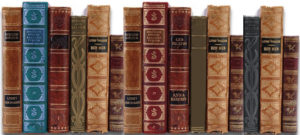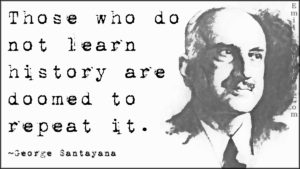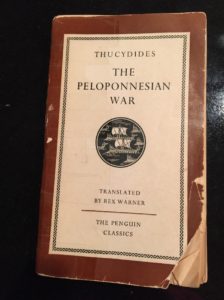How Classical Literature Makes You A Better Dad
Neil says: Classical literature – I love it. As a boy I spent hours pouring over books on Greek, Roman and Norse mythology. As I grew older I read more: Tolstoy, Dostoevsky, Shakespeare and Conrad. The biggest influencer on me? My Dad. He had shelves of classics in the house.
That’s why I jumped at the chance for Alex from Amatopia to write this guest post for me. Alex is an incredibly intelligent guy being a lawyer, writer, artist and a great father. Here are his thoughts on how classical literature can make you a better Dad.
Alex writes:
You’ve been there before: Somebody makes a reference that everybody around you understands but leaves you scratching your head. These other people, probably older, gray haired and wise, either laugh or stroke their chins deep in thought while you smile and nod so as not to be left out.
Or maybe you’re watching Jeopardy! and find you can’t answer a single question in many of the categories. Ashamed, you search your brain, hoping this knowledge is tucked away in some obscure corner. Didn’t you learn this stuff at some point in school?
Probably not.
I know I’ve been in this situation before. It’s not fun.
It makes me feel truly ignorant, more so than not knowing a random bit of popular trivia or even an answer to a work-related problem.
This is history!
This is culture!
This is my own civilization!!
How could I let myself stay in the dark for so long?
Can Classical Literature Save our Society?
The stuff in question is broadly defined as “The Classics,” the body of literature that makes up the philosophical and intellectual underpinning of Western Civilization. Shouldn’t the classics be common knowledge?
You would think. At some point, the educational establishment declared it to be old, irrelevant, useless, and quite frankly racist, sexist, and homophobic to boot. And so it’s been actively shunned, at least here in the United States.
This trend isn’t just depressing because I found myself unable to score points at cocktail parties. I noticed that all of the truly successful men and women I’ve met in my life were familiar with this stuff.
Maybe knowledge of the classics can help improve our lives in the here and now. Maybe these concepts can be applied to current-day problems and improve our odds of success.
And maybe, just maybe, familiarity with the classics can improve the quality of our characters as well as the quality of our thought.
As the father of a four-year-old boy, wouldn’t I want to arm him with this knowledge, gifted to us through the ages by these people of staggering intellect and drive?
It’s not like my father didn’t try. Talking to him is always a humbling experience. When he was in elementary school and high school in the 1960s, learning Latin, philosophy, logic, and the classics was mandatory. He tried to impart as much of this to me and my siblings as he could, but at the end of the day, it was incumbent upon us to do the reading ourselves.
My father encouraged this. Unfortunately, my education was far different than his.
By the time I got to high school, the curriculum had turned to include more modern writers, usually speaking to the current social purpose du jour. There’s nothing wrong with contemporary works, but I couldn’t shake the feeling that a few links were missing in the chain–even these new, oh-so modern authors were referencing stuff that went right over my head.
Far from being the bigoted ramblings of hoary, bearded, dead white guys, this stuff is just as vital and relevant as it was the day it was written.
Through their works, the great writers speak to us through the ages. We hamstring ourselves by refusing to hop on the shoulders of these giants and keep building.
Why the Classics Matter in the Here and Now
We all know the old saw that those who forget history are doomed to repeat it. Like most cliches, it became a cliche for a reason: Learning from mistakes and past experiences is one of, if not the most, effective way to learn, whether on an individual or a global scale.
But what if you have no history to forget? What if you’ve never learned that history in the first place?
Learning the classics can keep you humble. It is an equally true cliché that there is nothing new under the sun.
Stories, lessons, philosophy, and artwork become timeless for a reason. No matter how much progress we think we’ve made, human beings have been pretty smart for millennia.
This is not to say the modern world is wholly devoid of anything worthwhile. Quite the contrary. I’ll discard my nostalgia-tinted glasses and say this right now: There has never been a better time to be alive. And there’s plenty of great advice and information out there that will someday earn “timeless” status (This Dad Does springs to mind . . .)
One Simple Step to Learning the Classics
So what did I do about it?
Simple. I started reading.
One summer about ten years ago, I decided to read all of the stuff that I never did in high school. And my definition of “classics” is a bit broad, encompassing pre-20th century works.
Needless to say, it’s still a work in progress. But the lessons I have learned–about honor, duty, manhood, civics, hubris–have helped me be a better man and a better father.
Nine Literary Classics Every Dad Should Read
Here are some classics that I’ve found to be particularly enjoyable and instructive, along with what I’ve learned from them. Happy reading, and remember: all of those people living thousands of years ago were just as smart as we are today, so ignore them at your own peril.
1. The Old and the New Testament: Like a lot of Christians, I wasn’t as intimately knowledgeable about my own holy book as I should have been. Although I knew the stories from church, it wasn’t until 2009 that I read the entire Bible cover-to-cover.
And then I started reading it again.
Even if you’re not religious, the bulk of current Western society is based on the teachings from this book, so it’s a good idea to have at least a passing knowledge of it.
Biblical stories and idioms are so ingrained into our cultural DNA that you will have tons of “Oh, so that’s where it comes from!” moments. What’s more, the Bible’s authors, from Moses on through St. John the Apostle, had human nature pretty much pegged.
2. Thucydides, History of the Peloponnesian War: The Godfather of history, Thucydides, penned his chronicle of the twenty-year war between Athens and Sparta in a way that seems familiar to us now: Through interviews with those who fought and debated, the examination of primary sources, and from his own experience as a combatant on the Athenian side.
Where appropriate, Thucydides paraphrases important speeches, but his prose is so eloquent the original speakers likely wish they sounded so good!
But historiographical methodology aside, what struck me about Thucydides’s account of the war were his observations into the motivations of the varying factions, the hubris and the miscalculations, and ultimately Athens’ fatal overreach and arrogance that lead them to undertake their ill-fated war against Sicily–in true Greek fashion, it is a fatal flaw that proves to be the Athenian undoing.
Action, adventure, political intrigue, and keen insights into human nature. You’ll never think the same way about war and politics.
3. Homer, The Iliad and The Odyssey: If Thucydides was the godfather of history, then Homer is the godfather of the heroic epic. These two tales are the only surviving episodes in Homer’s multi-volume Trojan War epic.
The Iliad thrusts the reader into the final year of the battle between the Greeks and the Trojans, focusing on a disagreement between the legendary Greek hero and Achilles and the leader of the Greeks Agamemnon which leads to Achilles sitting in his tent in a sulk.
This allows the Trojans and their hero Prince Hector reign havoc as the Greeks bicker in typical Greek fashion. If you ever wanted to know what honor and valor meant to the ancients, The Iliad is the story for you. But more importantly, it teaches about that most grave of all sins, pride.
The Odyssey, on the other hand, is more of a fun action-adventure tale, chronicling the Greek hero Odysseus’s twenty-year journey back home to Ithaca after the war, but you’ll enjoy the revenge plot in its latter chapters.
4. Niccolo Machiavelli, The Prince: People get the wrong idea about Machiavelli. Sure, the advice given in The Prince is brutal, but you must realize that Machiavelli wrote it as a subtle dig at the de’ Medici family.
That said, The Prince lays the foundation for the modern-day political philosophy of realpolitik, taking into account man’s most base nature and how leaders should work to suppress and harness it for their own ends.
You will understand global politics far more from this 500-year-old book than you will from all of today’s newspapers combined.
5. Dante Alighieri, The Divine Comedy: Read for the imagery alone–I recommend the translation by Henry Wadsworth Longfellow. Much of what you think you know about Catholic theology comes from Dante.
And notice how I didn’t just recommend you read Inferno, which is merely part one of this three-part epic poem.
Through Dante, you will learn history, politics, mythology, and a whole heap of Christian thought and belief as you travel with Dante and his guide Virgil the poet through Hell, Purgatory, and Paradise.
6. William Shakespeare: The daddy of the English language. Shakespeare invented words so you don’t have to. More than that, through his stories he teaches about human nature in all of its glory: Love, hate, betrayal, prejudice, humor, heroism, arrogance, and revenge.
The man wrote so much, I can but recommend a few of my favorite plays: Othello, Macbeth, Hamlet, and Henry V. Yeah, I like the heavy stuff.
7. Miguel de Cervantes, Don Quixote: The story of Don Quixote, the old gentleman who reads one too many stories of chivalry and sets out to save the world along with his faithful sidekick Sancho Panza, is often called the first modern novel for its stylistic innovations and unorthodox structure.
There is so much in here, from tragedy to comedy, that to summarize would be to do it a disservice. Spoiler alert: The ending might make your eyes water just a little bit.
8. Herman Melville, Moby Dick: Yes, I know, an American author on a list of classics. I also know that Moby Dick is supposed to be boring, right?
Wrong.
I include Moby Dick here because, like the other classics I recommend here, the characters and themes of Moby Dick have become such an important part of our culture that you owe it to yourself to go the source. In addition to being a fascinating account of mid-19th century whaling culture, with a healthy dose of New England lore, Moby Dick teaches about obsession, rivalry, and the dangers of an unbalanced, single-minded pursuit.
9. Fyodor Dostoevsky, The Brothers Karamazov: Quite possibly the greatest novel I have ever read. The Brothers Karamazov touches on every single aspect of life, told with Dostoevsky’s deft touch of mixing the heavy with the humorous, the secular with the divine.
Each brother represents a different facet of humanity: piety, passion, intellect, and cunning. This is one of the heaviest books, and I don’t mean just due to its page count. I cannot recommend it enough.
So there you have it. Some recommended classics to get you started on your journey towards rediscovering the legacy of our Western civilization. If you have any further recommendations, please share them in the comments below.
Happy learning.
Alex is an attorney, a writer, and a musician living in the U.S. who blogs about a variety of things at his website Amatopia. You can find him on Twitter @DaytimeRenegade and on Instagram @TheDaytimeRenegade.
Psst. Neil here again. That was great, wasn’t it? Told you he was a smart guy. Anyway, if you’d like to get notifications on new posts (like this) then you can sign up here for my newsletter.




I believe I said this in a tweet a while ago but I’ll say it again. The classics provide most of the information we need right now to deal with a lot of the current problems that we have.
They covered a variety of topics and I’m by far not done with the old books but what is amazing is that a few (maybe a lot) of them are accurately explaining what we are dealing with right now, why it happened, and what we can and should do to deal with it.
They also provide great insights into self-improvement in my opinion far better advice than most of the new books give you.
So to wrap this up, I liked the post and I’d say The Classics not only make you a better Dad but a better man no matter what your age or situation in life is.
Thanks for the comment Timo!
When you say that the classics accurately describe our current world, and how we should deal with it, I couldn’t agree more. It always strikes me how little, if any, humanity has changed over the millennia.
From politics to love to war to self-improvement, great thinkers have grappled with head issues long before any of us started patting ourselves on the back over how smart we are. I’ll say it again: we ignore and discard our own intellectual legacy at our own peril.
Thanks for the comments. One thing that struck me from your choices is how many lessons there are for Dads, particularly in the Illiad, Bible and The Brothers Karamazov. These are by no means perfect images of fathers but we can learn a lot from buffoonery (The Brothers Karamazov), pride (The Illiad) and indifference towards our sons (David and Absalom in the Old Testament). As you both correctly highlight, these are ignored at our peril.
The Illiad and the Odyssey have lots of great father-son stuff, from the tragic (Hector and Priam, Hector and Astyanax) to the heroic (Odysseus and Telemachus). One could do a whole post on just those…